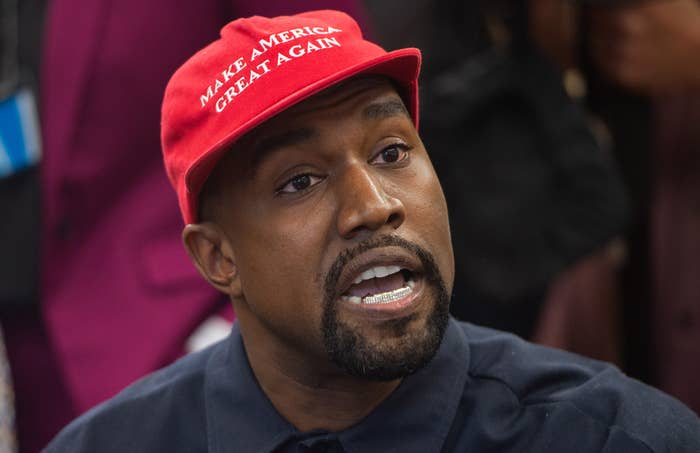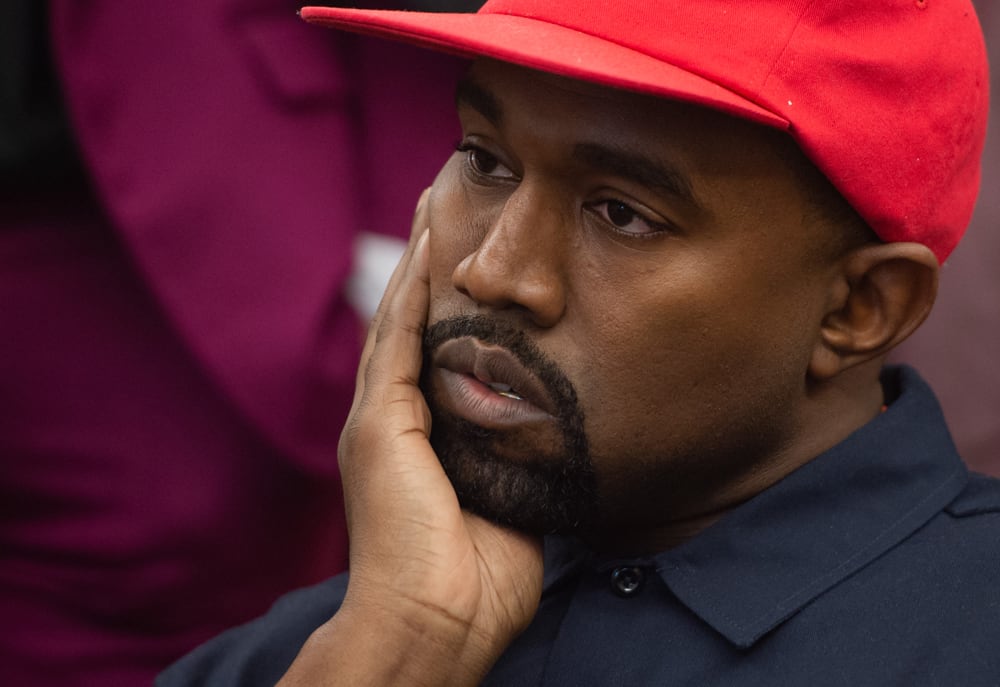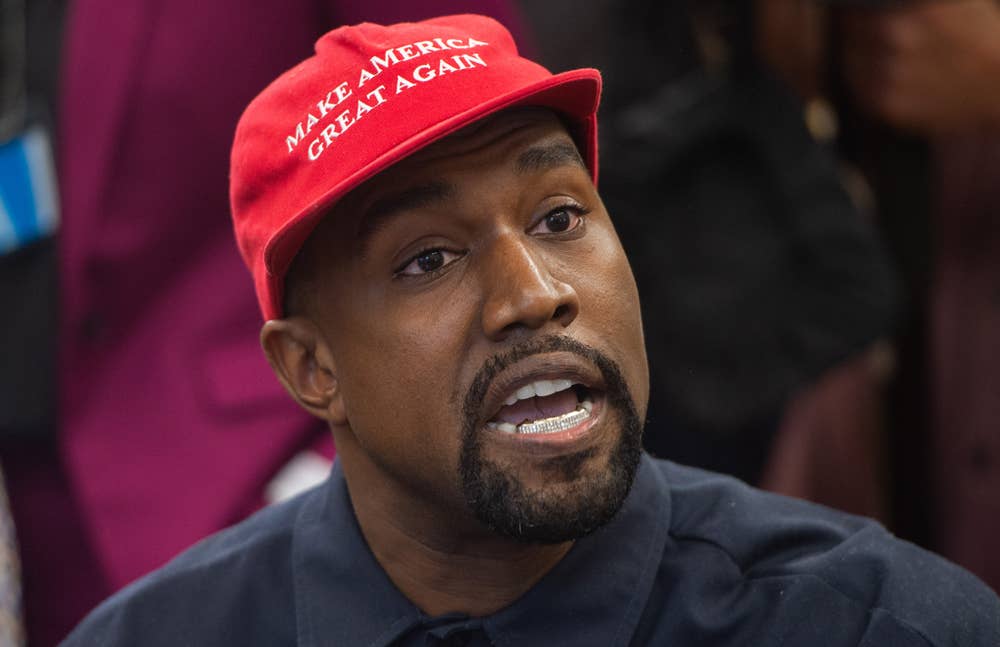
Last Thursday, Kanye West held court in the White House Oval Office, alongside Donald Trump. In his mess of a visit, Kanye said and did many things that required immediate attention: In one breath, he claimed the polarizing MAGA hat makes him feel “like Superman.” In another moment, he accidentally revealed his extremely hackable iPhone password.
Buried in the visit was a rushed announcement of sorts. “I was diagnosed with bipolar disorder,” West told Trump last week. “I was connected with a neuropsychologist that worked with athletes in the NBA and the NFL. He said that I actually wasn't bipolar, I had sleep deprivation, which could cause dementia 10 to 20 years from now where I wouldn't even remember my son's name.”
During a 10-minute Twitter video rant on Saturday, ‘Ye doubled down on this claim, and said he isn’t “crazy” like the media is purportedly leading everyone to believe. “It’s all part of a system to control your mind,” he said. “To control my mind. To make me look like I'm crazy to you. I am not crazy. I can ramp up if I suffer from sleep deprivation.”
Wait a minute. Wasn’t it just four months ago that Kanye shared his bipolar diagnosis with the world? Yes, your memory serves you right. I can unerringly reassure you of this because I, myself, am bipolar. And it was a big fucking deal that ‘Ye revealed his condition in the first place.
In early June, the rapper/producer/designer/professional Trump-stumper took it upon himself to make his private health concerns public. It was unexpected, because Kanye had thus far been tight-lipped about everything mental health-related. In the end, his openness was also to be expected—Kanye can never really keep anything to himself for too long.
His revelation took shape in various ways. First, at the end of Ye’s second track, “Yikes,” Kanye says:
That's why I fuck with ‘Ye
That's my third person
That's my bipolar shit, nigga what?
That's my superpower, nigga ain't no disability
I'm a superhero! I'm a superhero!
That wasn’t a big enough unveiling for Kanye—he took it a step further by placing the words “I hate being Bi-Polar, its awesome” on the cover of Ye. With those two pieces in place, there was no longer any question about what condition Kanye was living with. He said it outright, more than once.

The day after Kanye dropped Ye, I woke up knowing I would have to go into work and explain how I felt about having the same diagnosis as the most controversial figure in contemporary pop culture. (My “status” is public knowledge because I went missing in 2016, and had a manic episode in the Complex office last October.) Because Kanye is Kanye, a meeting was called first thing in the morning to discuss both him and Ye. Larger themes and ideas were kicked around, but eventually, I was asked my opinion by the editor-in-chief himself, Damien Scott. At that moment, all eyes in the room focused in on me. My voice shaking, I spoke every word of truth that I had been holding onto, both unconventional and traditional. Everything I never thought was possible to say. I pitched, and then eventually wrote an essay about it.
I saw Kanye’s revelation as a possible tool for significant change. Instead, he has chosen to walk back his diagnosis altogether
In that meeting, and later when the essay made it to the world, I used myself as a barrier between Kanye and his critics. I broke down how the highs of mania can seem like the most important thing in the world, and how it can make you feel like the chosen one. I also recognized that being bipolar is a blessing and a curse: on both the manic and depressive sides of the condition, you have virtually no emotional control. You’re just trying to come back down to earth, or rise up from the depths of dark thoughts. I got everything off my chest, because I had seen this coming for a while—once you’ve experienced the full spectrum of bipolar disorder, it becomes incredibly easy to spot similar behavior in others. I was ready to help Kanye, and help all of us: everyone who had ever been challenged with a mental issue.
While being interviewed by Big Boy in Wyoming after the listening session for Ye, Kanye said himself that he was diagnosed with a “mental condition” at the age of 39, around The Life of Pablo era. At that time, circa 2016, speculations about his stability were running wild before the album was released, during the heights of ‘Ye’s infamous Twitter rants, and later, during the disjointed and short-lived tour that followed.
He was diagnosed two years ago, but it wasn’t until this year that Kanye openly vocalized his perspective on mental health. In a May interview with Charlamagne tha God, Kanye spoke about his ultimate goal in the space: “I want to change the stigma of ‘crazy’ and the stigma of mental health, period,” he said. “Best believe I’m going to take the stigma off of the word ‘crazy.’”
On October 17, Kanye West was set to sit down with Charlamagne again, to give a New York Times-sponsored joint talk about mental health. Two days before the event, the conversation was canceled. While Kanye is actively working on his upcoming album, Yandhi, in Uganda, the talk was also canceled in part because Charlamagne felt it would ultimately be unproductive.
“Normalizing being mentally healthy is a conversation that I really wanted to have with Kanye because he's been so vocal about his own mental health struggles,” he wrote in an Instagram caption announcing the event’s demise. “Unfortunately I think to have that conversation with him right now would not be productive and a total distraction from the point of the convo which is to eradicate the stigma of mental health especially in the black community.”
Ignorance and mistreatment of mental health has long been an issue for black people in America. According to the National Alliance of Mental Health, African Americans are 20 percent more likely to experience serious mental health problems than the rest of the general population. Because of lack of information, faith-based alternative treatments, reluctance and inability to access mental health services, and inequality of care, black people are at a severe disadvantage when it comes to self-maintenance. For that reason, I saw Kanye’s revelation as a possible tool for significant change. Instead, he has chosen to walk back his diagnosis altogether.
Denial of diagnosis is a real thing. After experiencing severe side effects of the medication I was initially put on, I stopped them and drew back from acknowledging bipolar disorder altogether. Once I dropped the meds, I thought everything could just go back to the way it was before. Less than a year later, I had my second episode and was told that I need to stay on my treatment plan if I want to be stable, productive, and fulfilled.
While discussing Yandhi with TMZearlier this month, Kanye admitted he is no longer taking his medication. “Those five albums that I dropped earlier were like superhero rehabilitation,” he said. “Now the alien ‘Ye is fully back in mode, off of medication, working out, breathing as much fresh air as possible—thinking, doing, being himself.”
In an April interview with People, Mariah Carey, who was first diagnosed with bipolar disorder in 2001, said she also spent time in denial. “I didn’t want to believe it,” she said. “For a long time, I thought I had a severe sleep disorder. But it wasn’t normal insomnia and I wasn’t lying awake counting sheep. I was working and working and working... I was irritable and in constant fear of letting people down. It turns out that I was experiencing a form of mania. Eventually I would just hit a wall.”
Since the aforementioned interview, Mariah has been quiet about her day-to-day experience with bipolar disorder. ‘Ye, on the other hand, has been loud and messy. His entrance into the mental health discussion was a proverbial belly flop. Now that he’s starting to sink into the waters of public opinion, the sting of the rejection is making itself known. Instead of acknowledging the discomfort, Kanye is instead choosing to kick up a fuss and scream for the lifeguard, complaining that someone else told him to dive the wrong way. In other words, he wants a do-over.
But you don’t get to turn the concept of mental health inside out at your whim, just because things aren’t panning out the way you hoped. For the past four months, Kanye has done exactly that. Watching his behavior from the sidelines has been infuriating. It feels like a direct slap in the face from one of the most influential musicians to ever live.
The last paragraph of the essay I wrote following ‘Ye’s initial announcement was specifically about the power Kanye held:
If Kanye really wants to change the way we think about mental health, his next steps mean everything. He should continue to speak out loud about the unexpected intricacies of his diagnosis, because it will give people like me the space to speak our own truths. Most importantly, through the next days, weeks, months and years: he can’t take a detour from this perspective. If he sees this through, the conversation around mental health could be in for a revolutionary change.
At that moment, I truly believed Kanye was in a position to turn the extant, stagnant conversation around mental health into a multifaceted, forward-thinking dialogue of discovery.
At its core, this piece is a breakup letter to Kanye West. His diagnosis has moved me to defend him from fundamentally indefensible actions. I thought ‘Ye’s revelation would make my life easier. I thought having such a public figure admit he was bipolar would help others to understand my situation better. Not only did he make it more difficult for me to even talk about being bipolar anymore, he has now chosen to strip himself of the label altogether. This year, Kanye disturbed a hornet’s nest of controversy masquerading as one of us. Then he walked away to leave the rest of us to deal with it in his wake.
Deal with it, we will. Get plenty of rest while we clean up your mess, ‘Ye.

